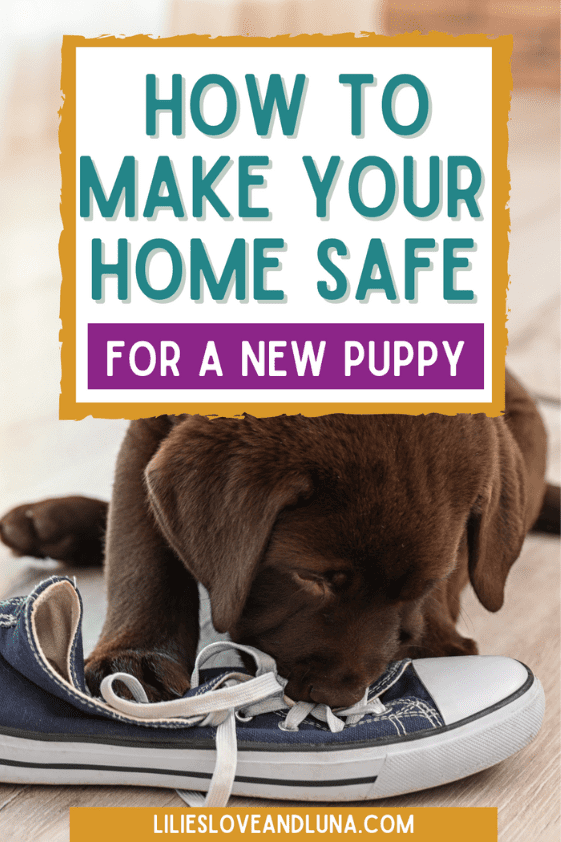Last Updated on November 5, 2025 by Shannon
Are you getting a new puppy? Congratulations! Bringing a new pet into your home is always an exciting experience. But before your furry friend can come home, there are some things you need to do to puppy-proof your house.
Puppy-proofing your home is important because it helps keep your pup safe and healthy. There are many dangers lurking in every room of the house, so it’s important to take the time to remove them before your new best friend arrives.
Not only will puppy-proofing make your home safer for your pup, but it will also help keep your house clean. Puppies are notorious for making a mess, so taking the time to prepare ahead of time will save you a lot of hassle down the road.
Follow our tips for how to puppy-proof your home and get ready for the arrival of your new furry friend!
This post may contain affiliate links. That means if you click on them and buy something, I may receive a small commission at no cost to you. Read my Disclaimer Policy to learn more.
What is puppy proofing and why is it important?
Puppy proofing is the process of making your home safe for a new puppy. This includes removing any potential hazards and dangerous objects that could potentially harm your new puppy.
Puppy proofing is important because it helps keep your pup safe from harm. Puppies are curious creatures who love to explore, and they can get into trouble quickly if they’re not supervised.
By taking the time to puppy-proof your home, you can help prevent accidents and keep your pup safe.
How to puppy-proof your home
There are many things you can do to puppy-proof your home. Here are a few tips for indoor and outdoor puppy-proofing.
Indoor puppy proofing tips
When puppy-proofing inside, you want to get on your puppy’s level. Get down on your hands and knees, if possible, and look around at eye level with your puppy. This will help you spot anything they may be tempted to try to get into.
Trash can

Trash cans can be very attractive to puppies, and even older dogs. Make sure they have a secure lid and that they are heavy enough to not be knocked over.
Even if you have a heavy, lidded trash can, your puppy may figure out how to open it. If this happens, you will need to put the can somewhere your puppy can’t get it.
This happened to me with Morgan. She loves bathroom garbage (I know, disgusting!) so I bought a can with a lid and a foot pedal. It worked wonders… until it didn’t.
She figured out she could nudge the lid open, and voila! She could get to the garbage. I have since put it up out of her reach.
Cleaning products

Keep all household cleaners, laundry detergent, and other chemicals out of reach of your puppy. Store them in a cabinet or closet that your puppy cannot access.
If you use a cleaning product that is toxic to dogs, make sure to thoroughly clean the area afterward so your puppy doesn’t accidentally ingest it.
Electrical cords
Puppies love to chew on things, and power cords are often something they go for. It’s important to keep all cords and wires out of reach or, better yet, hidden.
You can hide cords by running them along the baseboards or tucking them behind furniture. You can also invest in cord covers to keep them hidden and protected.
If your puppy does chew on a cord make sure to check it for damage. If you find any frayed wires, it’s important to get them fixed or replaced as soon as possible otherwise it could cause an electrical shock or worse.
Medications
Keep all medications, both human and animal, out of reach of your puppy. Store them in a cabinet or closet that your puppy cannot access.
When taking your medications, do it in an area away from your puppy. Accidents happen, and if a pill is dropped your puppy may get it and need a trip to the vet.
This actually happened to Luna when she was just a few months old. My son had a pill to take before school and he dropped it. Luna saw it fall and swooped it up faster than he could grab it.
After an urgent call to me at work, I called the vet. Luna had to go in as soon as I could get home. The vet was concerned that since she was a puppy it could cause issues for her.
They induced vomiting and looked for the pill, only finding some evidence of the pill coating. She was sent home to be under observation for the rest of the day.
Luckily we found the pill on the floor a few days later with some of the coating missing but the pill was whole. We never did figure out where the pill was for multiple days, but at least she didn’t swallow it.
After that, my son was instructed to have Luna in her kennel before he took his pill. Never again did he drop a pill when she was around.
Plastic bags
Plastic bags can be dangerous for puppies and dogs. If ingested, they can cause a blockage in the intestinal tract.
If you use plastic bags, make sure to put them away as soon as you’re done with them. Don’t leave them lying around where your puppy can get to them.
Poisonous houseplants
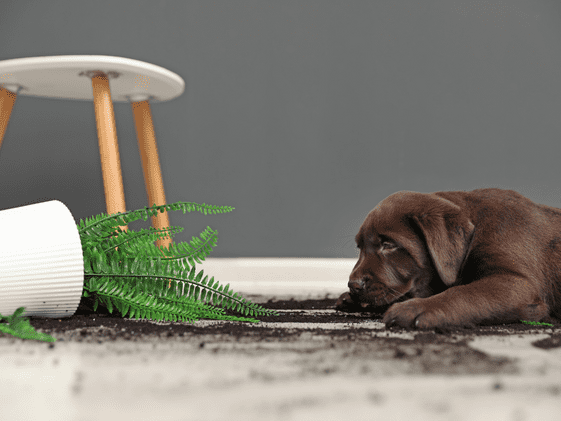
Some houseplants are poisonous to dogs. If ingested, they can cause vomiting, diarrhea, and sometimes even more serious health problems.
Make sure to do your research if you have houseplants, and find out which ones are safe for dogs. All poisonous plants should be kept out of reach of your puppy. Either put them up high where your dog can’t reach them or in a room your dog can’t get into.
Some common house plants that are toxic to dogs include pothos, sago palm, zz plant, and aloe. This is not a complete list as there are many poisonous plants.
Even if you don’t have poisonous houseplants, you want to keep them away from your puppy. They can knock the plants down, eat them or chew on them, and generally make a mess and potentially kill the plant.
Batteries
Batteries, both regular and lithium, can be dangerous for dogs. If ingested, they can cause burns or other health problems.
Keep all batteries out of reach of your puppy. Store them in a cabinet, closet, or drawer that your puppy cannot access.
Small items
Puppies like to put everything in their mouths, so it’s important to keep small objects out of reach. This includes things like coins, buttons, marbles, hair ties, paper clips, rubber bands, etc.
Small objects like these are easy for a puppy or even an adult dog to swallow. Unfortunately, while easy to swallow, many will not pass on their own.
If you think your puppy has swallowed a non-food object, call your vet immediately or take your puppy to the emergency vet.
Litterbox
If you have a cat, make sure to keep the litterbox out of reach of your puppy. Some puppies and adult dogs, like Morgan, enjoy eating from the litterbox. This disgusting habit is very hard to break, so it’s better to prevent it in the first place.
You may need to put the litterbox in a room that your puppy cannot get into but your cat can. You can use a gate, cat door, or the door buddy to keep your puppy out but allow your cat in.
Stairs
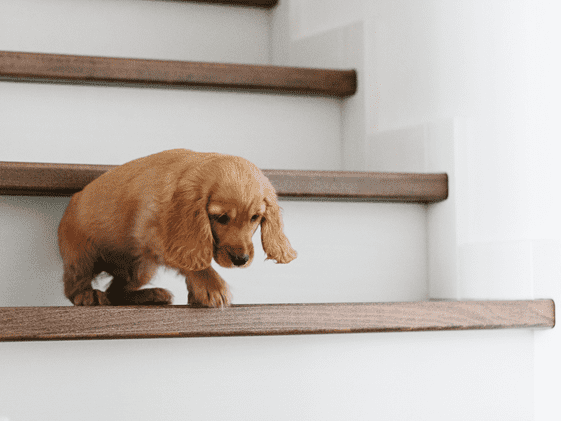
Stairs can be dangerous for puppies that aren’t used to them. They could fall down them and get hurt. Until you have taught your puppy how to safely go up and down the stairs, it’s best to block them off.
You can use a pet gate or baby gate to block off the stairs. If the stairs have a door, just keep that shut to keep your puppy away from the stairs.
Human food

There are many toxic foods, like sugar-free gum, chocolate, and coffee, that many people have in their homes.
Make sure to keep all food out of reach of your puppy. If you’re eating something that is dangerous for dogs, make sure to put it away as soon as you’re done. Don’t leave it lying around where your puppy can get to it.
This means keeping your counters cleared of all food, especially if you have a larger puppy or one that is very agile.
Toilet
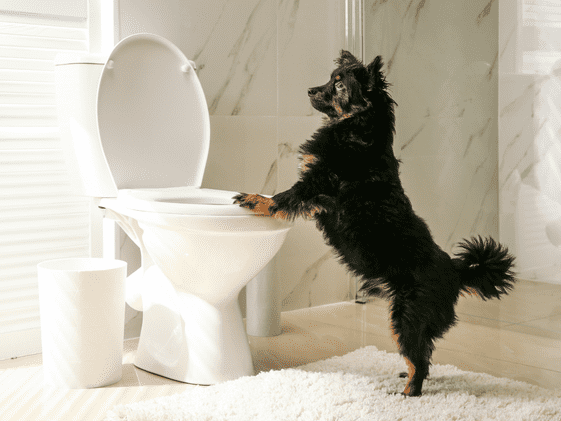
Some puppies and dogs enjoy drinking toilet water. To prevent this either keep the toilet lid down, or keep the bathroom door shut.
You don’t want to allow your puppy to drink toilet water as it could make him sick. It could have bacteria in it that can make them sick. Or residual toilet bowl cleaner in the water. Many toilet bowl cleaners are bad for any animal to swallow.
Furniture
Puppies like to chew on furniture. This could be anything from chairs and tables to bookcases and cabinets.
To prevent your puppy from chewing on your furniture you can use a taste deterrent. This is a spray that makes the furniture taste bad so that your puppy won’t want to chew on it.
You can also give your puppy something else to chew on, like a toy or bone. This will help redirect their chewing from your furniture to their toy.
Blind cords
The cords from blinds can be dangerous for dogs. They could get tangled in them and choke or strangle themselves.
To prevent this, keep all cords out of reach of your puppy. If possible, tuck them behind furniture or tie them up high where your puppy can’t reach them.
Some newer blinds don’t even come with cords anymore. I recently replaced all the blinds in my house (well my husband did most the work) and none of the new blinds came with cords to raise and lower them.
If you are thinking about replacing your blinds anyway, this would be the safest way to protect your puppy from the blind cords.
Doors and windows
Puppies can easily slip out an open door or window. Make sure that all exterior doors are securely shut when your puppy is loose in the house. Windows should be shut and locked as well.
If you have a screen door, that is not enough to keep your puppy in. Puppies can push through screens or even tear them.
To be safe, make sure all doors and windows are shut and locked when your puppy is loose in the house.
Shoes and clothing

Puppies like to chew on anything they can get their teeth on. This includes shoes and clothing.
To prevent your puppy from chewing on your shoes and clothing, keep them out of reach. If you’re not wearing them, put them away in a closet or another room that your puppy cannot get into.
You can also give your puppy something else to chew on, like a toy or bone. This will help redirect their chewing from your shoes and clothing to their toy.
Sharp objects
Puppies will attempt to chew on anything they happen to find, this includes sharp objects like knives and scissors.
Not only that, but they could also startle you while you are using these making you drop them. Make sure to know where your puppy is when using a knife or scissors and to put them away when not in use.
They should be stored in an area where your puppy cannot get them.
Fireplace
If you have a fireplace, make sure to keep the area around it clear of anything your puppy could trip over or knock into.
Puppies are curious and like to explore. They will try to get into anything they can. If you’re not using the fireplace, make sure to block off the area around it so that your puppy cannot get to it.
You should also have a screen in front of the fireplace to prevent your puppy from getting too close to the flames.
Puppies should never be left unsupervised in a room with a lit fire. If you need to leave the room briefly, take your puppy with you.
Outdoor puppy proofing
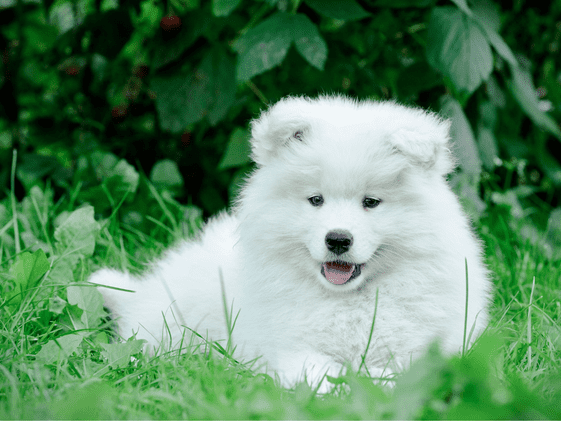
In addition to puppy-proofing your home, you will also need to puppy-proof your yard.
Garden plants
Just like houseplants, there are also toxic plants for dogs outdoors. If you have a garden, make sure that your puppy cannot get to any of the plants.
If you have flowers, consider replacing the poisonous ones with nonpoisonous plants. Or keep the plants in a part of the yard your puppy can’t get to.
Water features
Whether you have a pool, hot tub, or pond, all water features can be dangerous for puppies.
A puppy could get in and then not be able to get back out. If this happens and they are not found quickly enough, the puppy could end up drowning.
Make sure your puppy is never left alone with a water feature, especially if it is deep enough that your puppy can’t stand in it with their head above water.
Consider putting a fence around an inground pool or pond. And remove any steps that enable your puppy to get into an above-ground pool.
Outdoor chemicals
If you have any kind of outdoor chemicals, such as fertilizers or pesticides, make sure they are kept in a place where your puppy cannot get to them.
If you use chemicals in your yard or garden, ensure that your puppy is not in those areas until it is safe for them to be. Most, if not all, of these chemicals say how long you need to stay out of the yard after application.
Fishing gear
If you fish, make sure to put away all of your fishing gear when you’re done. This includes the fishing line, lures, and hooks.
Puppies can easily get tangled in fishing line or choke on a lure. Hooks can also be dangerous if your puppy swallows one.
Never leave your puppy alone with any of this gear, even for a short period of time.
Fire pit
If you have a fire pit, make sure that it is fully extinguished before leaving it unattended.
Puppies are curious and will want to explore the fire pit. If there are any embers still burning, they could be burned by them.
It’s also important to make sure that your puppy cannot get too close to the fire pit while it is in use. They could easily get burned if they got too close.
Dog poop
This may seem like an odd one, but it’s important to pick up your dog’s poop as soon as possible.
Some puppies, unfortunately, like to eat poop. And while most will outgrow it, not all of them will.
By picking up the poop as soon as possible, you limit their ability to eat it.
Supplies to keep your puppy safe
In addition to puppy-proofing your home and yard, there are a few other things you should have on hand to help keep your puppy safe.
Dog Crate
A dog crate is a great way to confine your puppy when you can’t watch them. It will help prevent them from getting into things they shouldn’t while they can’t be supervised.
Here are some tips for picking out the right crate for your dog.
Pet Gate
A pet gate, or a baby gate, can be used to block off areas of your home that you don’t want your puppy to have access to, like cat litter.
There are a variety of types to choose from. Take a look at Amazon or Chewy and choose the one that will work best for your space.
Cabinet locks
If you have cabinets or drawers containing anything your puppy could get into, it’s a good idea to install childproof latches or other cabinet locks on them.
This will help prevent your puppy from getting into things like cleaning supplies or medications.
Chew toys
Chew toys are a great way to help your puppy with their teething. They will also help prevent your puppy from chewing on things they shouldn’t, like furniture or shoes.
When choosing chew toys, make sure they are made of safe materials and that they are the appropriate size for your puppy.
Nylabones are a good option for chew toys. You can find them at most pet stores and online on Amazon and Chewy.
Final Thoughts
Puppies are a lot of fun, but they also require a lot of care. With just a little bit of planning, you can make your home safe and puppy-proof in no time.
By following these simple tips, you’ll be able to relax and enjoy your new furry friend without worry.
Thanks for reading, and good luck!
Related Posts
The Ultimate Guide To What You Need For A New Puppy
How To Survive The First 48 Hours With A New Puppy
How To Crate Train Your New Puppy
